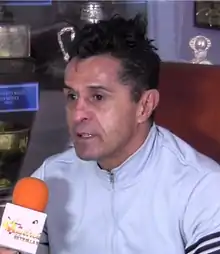 | |||||||||||
| Personal information | |||||||||||
|---|---|---|---|---|---|---|---|---|---|---|---|
| Full name | Efraín Herrera González | ||||||||||
| Date of birth | 28 September 1959 | ||||||||||
| Place of birth | Mexico City, Mexico | ||||||||||
| Height | 1.76 m (5 ft 9 in) | ||||||||||
| Position(s) | Defender | ||||||||||
| Senior career* | |||||||||||
| Years | Team | Apps | (Gls) | ||||||||
| 1978–1981 | Unión de Curtidores | 92 | (1) | ||||||||
| 1981–1985 | Atlas | 56 | (2) | ||||||||
| 1985–1989 | América | 93 | (0) | ||||||||
| 1989–1995 | Necaxa | 208 | (1) | ||||||||
| 1995–1996 | Toluca | 26 | (0) | ||||||||
| 1996–1998 | Pachuca | 11 | (0) | ||||||||
| International career | |||||||||||
| 1980–1991 | Mexico | 11 | (0) | ||||||||
Medal record
| |||||||||||
| *Club domestic league appearances and goals | |||||||||||
Efraín Herrera González (born 28 September 1959) is a Mexican former football defender who played for 20 years in the Mexican Primera División and represented the Mexico national team.
Career
Born in Mexico City, Herrera was a product of the Unión de Curtidores youth system and made his club debut in 1978. He spent most of his career with Club Necaxa, where he won the league title twice. At the end of his career, he joined C.F. Pachuca in the Primera A División and helped the club gain promotion before he retired in 1998.[1] Overall, Herrera had a 20-year career and made over 450 Mexican Primera División appearances with Unión de Curtidores, Club Atlas, Club América, Club Necaxa, Deportivo Toluca F.C. and C.F. Pachuca.[2]
He represented Mexico at the 1991 CONCACAF Gold Cup finals.[3]
After he retired from playing, Herrera became a football coach. He was assistant to Juan Antonio Luna at Club Tijuana during 2009 and 2010.[4]
References
- ↑ "Glorias Pasadas: ¿Qué fue de Efraín "El Cuchillo" Herrera?" [Glories of the past: Who was Efraín "The Knife" Herrera?] (in Spanish). Glorias Pasadas. 28 July 2010.
- ↑ "Efraín "Cuchillo" Herrera; siempre figura" [Efraín "Knife" Herrera; always contained] (in Spanish). El Sol de Tulancingo. 20 January 2009.
- ↑ Courtney, Barrie (12 June 2009). "CONCACAF Championship, Gold Cup 1991 - Full Details". RSSSF.
- ↑ "El 'Cuchillo' Herrera confía en los Xoloitzcuintles" [The 'Knife' Herrera relies on the Xoloitzcuintles] (in Spanish). Medio Tiempo. 4 January 2010.
External links
- Efraín Herrera González at Liga MX (in Spanish)
- Efraín Herrera – Liga MX stats at MedioTiempo.com (archive) (in Spanish)
- Efraín Herrera at National-Football-Teams.com